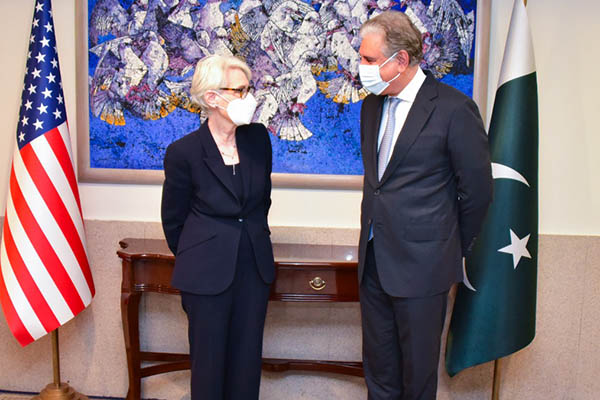
U.S. Deputy Secretary of State Wendy Sherman with Foreign Minister Shah Mahmood Qureshi
In meeting with Foreign Minister Qureshi, U.S. deputy secretary of state appreciates Islamabad’s ongoing efforts for regional peace
Pakistan and the U.S. on Friday agreed to continue their communication and coordination on Afghanistan, security and counter-terrorism, trade and investment, climate change, economic cooperation and regional connectivity.
According to a statement issued by the Foreign Office, U.S. Deputy Secretary of State Wendy Sherman—during a two-day visit to Islamabad—met Foreign Minister Shah Mahmood Qureshi in Islamabad, with both leaders underscoring the importance of the long-standing relationship between their two states.
Qureshi underlined Pakistan’s commitment to forge a broad-based, long-term and sustainable relationship with the U.S., stressing sustained and structured dialogue was vital for the promotion of common interests and to advance shared regional objectives. He reiterated that there was a fundamental convergence between Pakistan and the United States on the need for a peaceful settlement in Afghanistan.
The foreign minister reiterated his stance that an inclusive and broad-based political structure reflecting the ethnic diversity of Afghan society was essential for Afghanistan’s stability and progress and emphasized that the international community must not abandon Afghanistan at this junction to avoid a humanitarian crisis.
Qureshi also highlighted Delhi’s human rights abuses in India-held Kashmir, adding that a peaceful resolution to the Kashmir dispute was essential to ensure durable peace and stability in South Asia.
Sherman, according to the Foreign Office, appreciated Pakistan’s continued efforts for peace in the region and assistance in the evacuation of U.S. citizens and others from Afghanistan.
Call coming soon?
In a subsequent meeting with journalists in Islamabad, Sherman emphasized that Pakistan and the U.S. could continue their dialogue on counter-terrorism. “The United States and Pakistan have a long history of security cooperation and deep personal relationships between our military leaders, both of which are essential components of our counter-terrorism efforts,” she said, though she did not specify what expectations Washington had of Islamabad.
Broadly speaking, she said, the U.S. would like to ensure “there is no terrorism here in Pakistan, in Afghanistan or in any country in the region or in the world for that matter.”
The focus on counter-terrorism reflects Washington’s shifting priorities, as most evident from Sherman’s comments at an event in Mumbai a day earlier. Claiming that the U.S. no longer saw itself nurturing a “broad-based” relationship with Pakistan, she stressed that the purpose of her visit to Islamabad was “specific and narrow” in its focus on Afghanistan.
During her press interaction in Islamabad, the U.S. official sought to downplay her commentary in India, saying ties between the U.S. and Pakistan had dealt with a wide range of issues for decades. She noted that her meetings in Islamabad had included discussions on geo-economics, clean energy, COP 26, and cooperation against COVID-19. However, she stressed, the primary purpose of this visit remained the situation in Afghanistan.
To a question on there being no direct contact between U.S. President Joe Biden and Prime Minister Imran Khan thus far, Sherman claimed it was not a significant omission. “We totally understand that every country wants a call from the president … and I’m sure it’ll happen sooner rather than later,” she said.
In addition to Qureshi, Sherman also met National Security Adviser Moeed Yusuf and Chief of Army Staff Gen. Qamar Bajwa.
